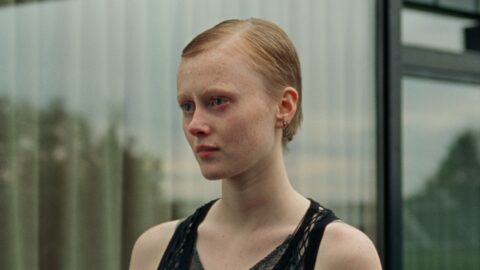After tales of sexual assault, alcoholism and isolation, it appeared that Icelandic auteur Rúnar Rúnarsson softened somewhat with the sentimental mosaic masterpiece Echo (2019), the kind of movie that you could screen for arthouse audiences and play as a Christmas crowdpleaser.
Thankfully for Rúnarsson-ultras (“we preferred your earlier, sadder movies”), UCR opener When the Light Breaks (2024) is a somewhat successful return to his intensely-focussed single character works, with his shattered lead Una (Elín Hall) occupying almost every frame of this tight 75-minute work. Yet, within the grief that permeates every scene — filtering through like the light from the sun touching every part of the earth — is a concerted attempt to find a common humanity and emotion that develops upon the we-are-the-world vibes of Echo.
Taking place over a mere 24 hours, When the Light Breaks starts in media res. Una and her lover Diddi (Baldur Einarsson) are by the ocean — canoodling, chatting, cavorting. They discuss travel plans (Faroe Islands, Japan) and Diddi’s plans to finally break up with his childhood sweetheart Klara (Katla Njálsdóttir). To stress the beauty — and the fragility — of their love, Rúnarsson shoots at twilight, the sun fading on their relationship much sooner than they think. Diddi dies the very next day.
Keeping a very close focus on Una, aided and abetted by clingy handheld frames, we witness her process her grief in private while Klara (flying in from the other side of the country) is paraded by mutual friends as the perfect victim. The ironies pile higher and higher. Especially when Klara appears to be a rather obnoxious person who doesn’t understand Una’s way of life — confusing her pansexuality with lesbianism, shitting on performance art, etc. But ultimately, while grief can cleave you in half, it can also bind you to another, the two women finding connection in shared loss.
Particularly fascinating is the age group Rúnarsson picks. Una and her friends are all in their last year of university, possessing the learnings of academia, but still cocooned from the pressures of genuine adulthood. Diddi’s accident (you can’t predict it!) forces them to grow up fast, in messy and unpredictable ways.
It’s a depressing and oftentimes moving film, especially for the way the camera captures grief in odd angles — and by how Una’s misery is ironically contrasted with kids in dress-up celebrating the end of school. Moment to moment, it moves with grace and nuance, with a standout performance by Hall. But all that is eventually undermined by the same sentimentality that made Echo a success, especially when the film tees up a brilliant and savage opportunity before eschewing it completely. My inner Rúnarsson ultra was begging for violence.

Redmond is the editor-in-chief of Journey Into Cinema.




